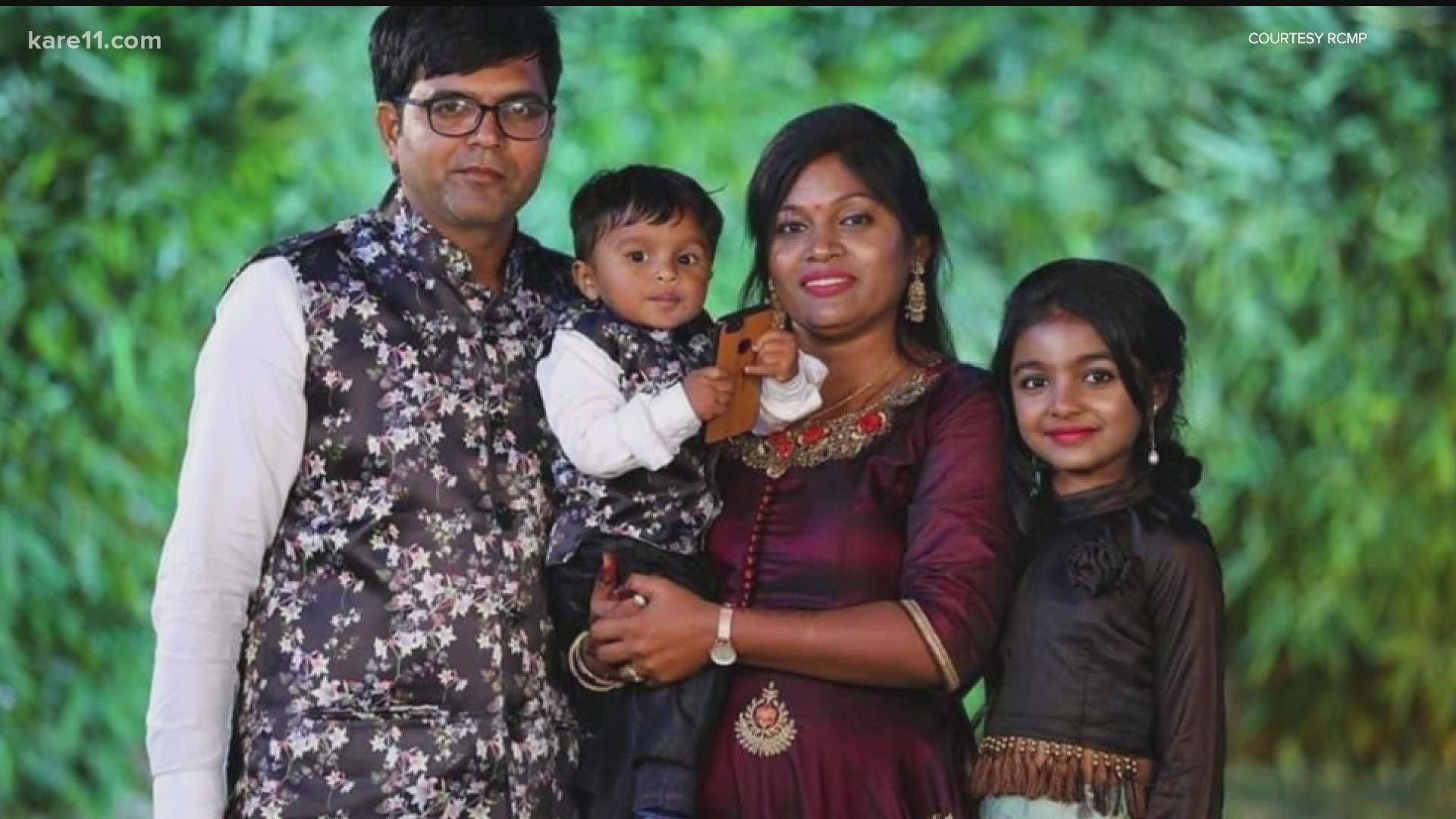ST PAUL, Minn. — When Hitesh and Varsha Pavagadhi learned the family of four who froze to death at the Canada-U.S. border hailed from the state of Gujarat in western India, they immediately asked how they could help.
The Pavagadhis, who moved to the U.S. with their young children about two decades ago before settling in the Twin Cities in 2007, are part of a vibrant Gujarati American community totaling about 5,000 people in Minnesota. For the past week, they have struggled to process the news from the northern border, where Jagdishkumar Patel, Vaishaliben Patel, their 11-year-old daughter Vihangi, and three-year-old son Dharmik died attempting to cross into the United States near northwestern Minnesota and North Dakota.
According to multiple reports, the Patel family had traveled to Canada from the small village of Dingucha, about an hour’s drive north of the Pavagadhis' original hometown of Ahmedabad.
“It was devastating. It was a shock to us within the community,” Hitesh Pavagadhi said, “that the poor members of that family who died were part of the Gujarati community. It was very unfortunate to hear about that incident, having a small kid and trying to cross the border during the night.”
Federal authorities in the United States have said the Patel family may have become separated from a group of seven other natives of Gujarat, some of whom told investigators they walked in sub-zero temperatures for more than 11 hours.
In a criminal complaint, the U.S. Attorney’s Office in Minnesota has linked the case to a human smuggling investigation, charging 47-year-old Florida resident Steve Shand for using a van he rented from Minneapolis-St. Paul International Airport to pick up at least two of the Indian natives on the U.S. side of the border.
On the Canadian side, the Royal Canadian Mounted Police now say they believe “someone drove the [Patel] family to the border and then left the scene.”
For the Gujarati American community in Minnesota, the human smuggling aspect of the case has been “a different shock altogether,” according to Hitesh Pavagadhi.
“This is something that we never even thought about,” he said, “that this could happen to someone who we are very close to, part of the [Gujarati] community.”
It is not exactly clear why the Patels attempted to enter the United States, but several international news outlets have visited their village of Dingucha to learn more.
Quoting a cousin, Reuters reported that “the couple felt they were struggling to run their home and the kids needed better education… they decided to leave India because they failed to find a good job here,” adding that a significant number of people in the village have pursued opportunities in America in recent years.
The BBC, meanwhile, interviewed neighbors in Dingucha, who said the Patel family had left for Canada on a visitor visa and that after they were not heard from over a period of five days, “everyone here feared that they might have been in trouble and so we decided to write to the Ministry of External Affairs.”
Back here at home in Minnesota, Hitesh Pavagadhi could only speak generally about why some natives of Gujarat seek opportunities in the United States. Pavagadhi, a longtime IT consultant, first moved here to pursue his master’s degree.
“It’s considered a [point of] pride in some parts of Gujarat, where some people feel that if they or one of their family members is in the U.S., it’s considered good,” Pavagadhi said. “Like my brother and I, when we moved here, we came for education and then decided to settle here.”
At this point, it’s also not clear why the Patels wanted to enter America by stopping first through Canada. The Royal Canadian Mounted Police said they appear to have arrived in Toronto on Jan. 12, before traveling to Emerson, Manitoba, on Jan. 18.
“We need anyone who had interaction with the Patel family, or has information about their journey to the border, to think about what they went through,” RCMP Manitoba Chief Superintendent Rob Hill said, “and to step forward.”
Meanwhile, the seven other natives of Gujarat who survived the border crossing have been released from Border Patrol custody, according to a spokesperson for U.S. Customs and Border Protection. However, the spokesperson said all “were administratively processed for removal and/or placed into removal proceedings as per the Immigration and Nationality Act,” adding that six were given an “order of supervision” and one was released “on an Order of Recognizance for humanitarian purposes.” All will have to report to ICE at some point, according to CBP.
“We’d like to approach and find out who those seven people are, and see if we can help in any way,” Hitesh said. “Similarly, with the four people that died – we are trying to connect with their families in India as well.”
His wife, Varsha, meanwhile, said she’s been sharing the Patel family photo with members of her community in Minnesota, just to see if anyone recognizes them. The local non-profit Gujarati Samaj of Minnesota, which Varsha once headed as president, also wants to provide assistance wherever possible.
In the meantime, the search for answers in this tragedy will continue.
“It’s unheard of,” Hitesh said. “Unthinkable.”
Watch more local news:
Watch the latest local news from the Twin Cities in our YouTube playlist:

